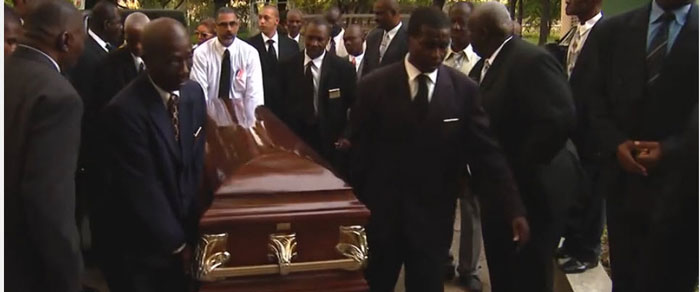The unexpected death of Jean-Claude ‘Baby Doc’ Duvalier from a heart attack ensures that the former dictator will not have to account for the crimes that were committed under his 15 year regime. While estimates vary, organisations such as Human Rights Watch believe that somewhere between 20,000 and 30,000 Haitian citizens were killed during the Duvalier years with the notorious Fort Dimanche a locus for state-sponsored terror.
Opposition and human rights organisations were upset, if not surprised, by the response of President Michel Martelly to Baby Doc’s death. Martelly took to Twitter to offer ‘sincere condolences to the family and to the nation’ and to proclaim Duvalier ‘an authentic son of Haiti’. The latter tweet, especially, drew widespread criticism.
Although Martelly’s spokesperson apparently suggested to Agence-France Presse that ‘protocol’ demanded that Duvalier receive a state funeral, the President eventually resisted the temptation to grant the former President-for-life this privilege.
A state funeral would have been an affront to all those who suffered violence and intimidation at the hands of the tontons macoutes, and would certainly have been condemned by many outside Haiti. As Alex Dupuy told the Associated Press ‘To have a state funeral for him would have signalled perhaps a vindication of what that regime represented rather than a condemnation of it’.
While Reed Brody, a lawyer with Human Rights Watch, told Al Jazeera that ‘His death really deprives Haiti and its victims of what could have been one of the most important trials in Haitian history, others including the Collective Against Impunity and the National Human Rights Network, have called for the trial to go ahead. Pierre Espérance, NHRN Executive Director, has said that Baby Doc’s death should not ‘bring an end to legal proceedings’ against the Duvalier regime ‘as Duvalier’s victims have also filed complaints against the former dictator’s acolytes’.
Duvalier’s Return
While Martelly remains in power, however, such an outcome seems highly unlikely.

Many were surprised when Baby Doc returned to Haiti in 2011 after 25 years in exile in Paris. It is surely significant that he delayed his return until Martelly was in power, believing that this administration would not prosecute him if he set foot on Haitian soil again.
Although a Haitian court decreed that Duvalier could stand trial for crimes against humanity, critics have suggested that Martelly did everything he could to ensure that such a trial would not take place. The former dictator was seen at various engagements and events alongside Martelly upon his return to Haiti. Jonathan Katz points to Duvalier ‘puttering around’ Port-au-Prince’s best restaurants accompanied by his wife Veronique Roy while remaining entirely ‘unmolested by the courts’.
‘Duvalierism after Duvalier’
Many commentators point to the persistence of Duvalierist strategies within the Martelly administration – a case of what Michel-Rolph Trouillot, in his insightful book State Against Nation, called ‘Duvalierism after Duvalier’ .
Amy Wilentz, author of The Rainy Season, argues that Martelly’s government continues to deploy Duvalierism’s ‘political toolbox’ to control the country. Wilentz points to Martelly’s penchant for authoritarianism, as well as ‘trumped up elections, distrust of free speech, corruption of the forces of order, and no justice’.
 Martelly’s links to Duvalierism are indexed by the fact that he has employed Baby Doc’s son Nicolas as an advisor and by the presence of Duvalierists and children of Duvalierists such as interior minister David Bazile, youth and sports minister Magalie Racine (daughter of Madame Max Adolphe, the warden of Fort Dimanche), and Public Works Secretary of State Philippe Cinéas in his administration.
Martelly’s links to Duvalierism are indexed by the fact that he has employed Baby Doc’s son Nicolas as an advisor and by the presence of Duvalierists and children of Duvalierists such as interior minister David Bazile, youth and sports minister Magalie Racine (daughter of Madame Max Adolphe, the warden of Fort Dimanche), and Public Works Secretary of State Philippe Cinéas in his administration.
Some critics have suggested that Martelly’s economic agenda is similar to that advanced by Duvalier. Martelly’s neoliberal economic development programme with its renewed emphasis on tourism and on industrial parks ‘resembles’ that of Baby Doc according to Katz. Under Baby Doc, American companies were offered significant tax breaks to produce various goods for export to the U.S. market. At one point, every baseball used in MLB was manufactured in Haiti.
A further index of the persistence of Duvalierism in Martelly’s Haiti lies in the intimidation of those who oppose the regime. The threats issued to various civil rights activists and the murder of Daniel Dorsinvil and his wife Girldy Larêche are indicative, as are attempts to arrest former President Jean-Bertrand Aristide. Many, including the Haiti Support Group, see the killing of Dorsinvil – a vocal critic of the Martelly government – and the efforts to go after the still-popular Aristide as being politically motivated.
Main image: from an Al Jazeera video.

